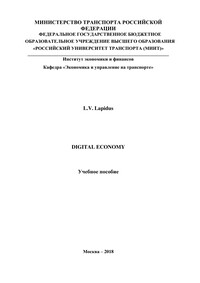Digital Economy
Покупка
Основная коллекция
Тематика:
Экономика информационных технологий
Издательство:
Российский университет транспорта
Автор:
Лапидус Лариса Владимировна
Год издания: 2018
Кол-во страниц: 42
Дополнительно
The basics of the digital economy are disclosed in this tutorial. The correlations between the concepts "digital economy”, "Industry 4.0”, "fourth industrial revolution” are substantiated. The digital economy evolution is analyzed and the transition to new models of production, distribution, exchange and consumption is justified. It is shown, that at present, the main goal is to trigger a systemic transformation, what implies the search for new mechanisms and tools to strengthen the participation of the state, business, and every citizen in the development of the digital economy in order to achieve a comprehensive result at all levels, from small businesses to the state as a whole.
Скопировать запись
Фрагмент текстового слоя документа размещен для индексирующих роботов
МИНИСТЕРСТВО ТРАНСПОРТА РОССИЙСКОЙ ФЕДЕРАЦИИ ФЕДЕРАЛЬНОЕ ГОСУДАРСТВЕННОЕ БЮДЖЕТНОЕ ОБРАЗОВАТЕЛЬНОЕ УЧРЕЖДЕНИЕ ВЫСШЕГО ОБРАЗОВАНИЯ «РОССИЙСКИЙ УНИВЕРСИТЕТ ТРАНСПОРТА (МИИТ)» ____________________________________________________________ Институт экономики и финансов Кафедра «Экономика и управление на транспорте» L.V. Lapidus DIGITAL ECONOMY Учебное пособие Москва – 2018
МИНИСТЕРСТВО ТРАНСПОРТА РОССИЙСКОЙ ФЕДЕРАЦИИ ФЕДЕРАЛЬНОЕ ГОСУДАРСТВЕННОЕ БЮДЖЕТНОЕ ОБРАЗОВАТЕЛЬНОЕ УЧРЕЖДЕНИЕ ВЫСШЕГО ОБРАЗОВАНИЯ «РОССИЙСКИЙ УНИВЕРСИТЕТ ТРАНСПОРТА (МИИТ)» ____________________________________________________________ Институт экономики и финансов Кафедра «Экономика и управление на транспорте» L.V. Lapidus DIGITAL ECONOMY Учебное пособие для бакалавров и магистров по направлениям «Экономика» и «Менеджмент» Москва – 2018
УДК 004
Л 24
Lapidus L.V. Digital Economy (на англ. яз.): Учебное пособие для бакалавров и
магистров по направлениям «Экономика» и «Менеджмент». – М.: РУТ (МИИТ), 2018. - 42 с.
The basics of the digital economy are disclosed in this tutorial. The correlations between the
concepts “digital economy”, “Industry 4.0”, “fourth industrial revolution” are substantiated. The
digital economy evolution is analyzed and the transition to new models of production, distribution,
exchange and consumption is justified. It is shown, that at present, the main goal is to trigger a
systemic transformation, what implies the search for new mechanisms and tools to strengthen the
participation of the state, business, and every citizen in the development of the digital economy in
order to achieve a comprehensive result at all levels, from small businesses to the state as a whole.
Рецензенты:
Профессор кафедры «Экономика, организация производства и менеджмент» РУТ (МИИТ),
д.э.н. О.В. Ефимова.
Начальник отдела управления доходностью АО «Федеральная пассажирская компания»,
к.э.н. А.А. Губанова.
РУТ (МИИТ), 2018
CONTENT Introduction. 1. What is the Digital Economy? 2. The Reference of the Concepts of "Industry 4.0" and "Digital economy". 3. What is the Fourth Industrial Revolution? 4. Evolution of the Society and the new Technological shift. 5. The Digital Economy Evolution. 6. The Origin of Online Business and The Dotcom Crisis. 7. The Digital Products and Electronic Services New markets. 8. Industry 4.0 Technologies and Business Benefits. 9. Signs of the Digital Economy. 10. Transformation of Business Models. 11. Decentralized Production. 12. Digital Leadership Strategies and Business Prospects. 13. The Industry Features of Digital Transformation. 14. The Key Principles of Digitalization and Industry 4.0. 15. System Digital Transformation: Objectives and the Necessary Conditions for Successful Transformation. Conclusion. Bibliography. Glossary. 4 6 7 9 10 11 14 17 22 23 24 26 26 29 32 32 35 36 39
Introduction To live in the era of technological change is pure luck. Digital economy, Industry 4.0, e-business, blockchain and bitcoins - every day brings new questions that you seek answers to. Everyone caught the "digital fever". Companies are launching digital transformation, restructuring business processes and designing new business models. States direct all efforts towards improving the country's competitiveness and the quality of life of the population. Citizens improve their digital literacy and develop future competencies. The world is preparing for the fourth industrial revolution. (L.V. Lapidus) The digital economy is a “living”, constantly evolving “organism”, whose behavior cannot be fully studied. Every day brings more and more new technological solutions with the according terms that are the results of the latest transformations and the need to make decisions on the choice of alternatives. The most important goal is the one of gaining, obtaining knowledge in the field of digital economics and technology, and of understanding of cause-effect links and correlations brought to light since 1990. For example, many countries caught the real “digital fever”, when Bitcoin (Bitcoin, BTC), which appeared in 2009, only in 2017 showed a rapid growth from $ 800 to $ 11,000. The total capitalization of the Bitcoin market by the end of 2017 reached 300 billion US dollars. For comparison, the world turnover of bitcoins at the beginning of 2014 was estimated at 11 billion US dollars [coinmarketcap.com]. Other popular cryptocurrencies are Peercoin (PPC, 2012), Dogecoin (DOGE, 2013), Etherium (ETH, 2015), etc. The market of all cryptocurrencies at the beginning of 2018 was $573.98 billion. New terms appeared (ICO, token, mining farms, etc.). All this led to the emergence of new types of electronic services: services of crypto farms, bitcoin farms, crypto funds, etc. According to the world practice, the evaluation of the digital economy is done with respect to the Internet markets, whereas Internet-dependent markets are appraised separately. The same practice is adopted in the Russian Federation. Thus, by the end of 2016, the share of the digital economy in the GDP of the Russian Federation was estimated at 2.8% of GDP (Internet markets) and 19% of GDP (Internet-dependent markets). The e-commerce market was estimated at 1238 billion rubles, the digital content market at 63 billion rubles, marketing and advertising - 171 billion rubles, infrastructure and software - 2000 billion rubles. 2.5 million jobs have been created in the Internet industry1. 1 According to the Russian Association of Electronic Communications (RAEC). Zvereva T. Internet economics: zones of stability. Thematic pages of RBC +. April 13, 2016. P. 3; Economy Runet. Study “Economics of Internet Services and Content Markets in Russia 2014–2015» / RAEC, HSE. ЭкономикаРунета.рф. P. 5.

